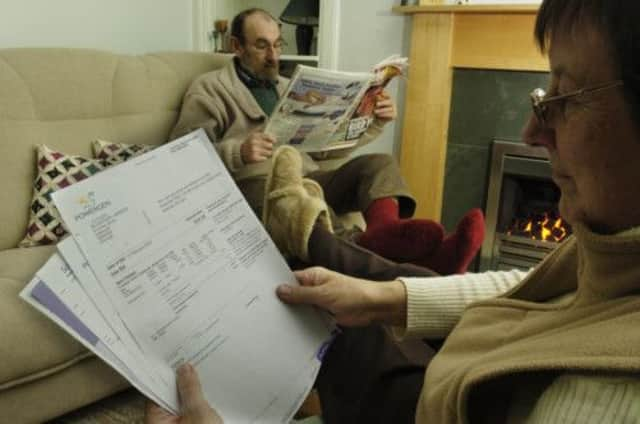Energy bills: Families face paying millions more


Energy tariff reforms from Ofgem could mean higher costs for more than 3.4 million households as they struggle to identify the cheapest energy tariffs, according to research by Which?
Ofgem’s proposed tariff comparison rate (TCR) aims to simplify energy tariffs and allow consumers to compare tariffs across the market.
Advertisement
Hide AdAdvertisement
Hide AdConsumers will be advised on their best deal based on medium usage of gas and electricity. The TCR system works like an APR used to compare loan and credit card annual interest rates, providing an illustrative cost for an energy tariff based on medium gas and electricity usage.
However, only 26 per cent of consumers use this level of energy, according to Which? It said the remaining 74 per cent of customers will be directed to tariffs which could be unsuitable for their usage and may cost them more.
About 500,000 low-energy users, who tend to be on the lowest incomes, could be advised on the wrong tariffs. Which? believes that the new proposals do not go far enough to help consumers navigate the maze of complicated energy tariffs.
It is calling for the introduction of a single unit price for energy tariffs, in the same way petrol prices are displayed, to enable consumers to easily compare prices and find the best deal for them. Richard Lloyd, executive director at Which?, said: “Rising energy bills remain one of consumers’ top financial concerns, yet six in ten of us have never switched supplier as people are left baffled by the vast array of complicated tariffs.
“These current proposals are far too complicated and will fail to achieve their aim of making it easier for people to find the best deal, with three-quarters of people being asked to compare prices that are not based on their energy usage.
“The government should introduce single unit prices for each energy tariff so people can easily see the best deal for them at a glance. Only then will people have the confidence to switch, injecting much-needed competition into the broken energy market.”
It is not the first time Ofgem’s proposals have raised fears over higher bills for many households. When the reforms were announced in October, Adam Scorer, director of policy at Consumer Focus, said that while they were sensible, they carried “a risk of unintended consequences and in particular a general levelling up of prices”.
It comes as rises in gas and electricity prices have forced millions of households into debt with their energy suppliers.
Advertisement
Hide AdAdvertisement
Hide AdOne in four Scottish households has ignored utility bills because they could not afford to pay them, sending them deeper into arrears with energy suppliers, according to research earlier this month. More than 170,000 Scottish households owe money to at least one utility provider.
Half of Brits feel worse off
Half of Britons feel they have become financially worse off over the last year, according to new research.
People in their 40s and 50s were the most likely to be feeling the squeeze, with 55 per cent and 60 per cent respectively, saying that their budgets have deteriorated, compared with 49 per cent across all age groups, according to Halifax.
Meanwhile, those in their 30s, which is often the age when people have young children, were the most likely to have run out of money at least once before the next payday last year, with 58 per cent in this age group saying this had happened to them.
Forty-somethings, who also tend to have children still living at home, were also particularly likely to have run out of cash before the end of the month, with 57 per cent saying this.
Despite the continued tough economic climate and high living costs, nearly three-quarters said they felt they were coping.
People in their 60s are managing best, with 87 per cent saying they were OK.
Family finances on the slide, poll reveals
The squeeze on families’ finances tightened its grip in April for the first time in 2013, a report has found.
Advertisement
Hide AdAdvertisement
Hide AdFour times as many households reported that their budgets worsened compared with those who saw an improvement, according to the latest household finance index compiled by financial information firm Markit.
The overall reading for April was 37.7, down from 39.3 in March and marking the first time this year that the downturn in financial wellbeing has deepened month-on-month. Readings above 50 indicate that people’s finances are improving and those below this point show a deterioration.
Markit said that the worsening finances largely reflect an ongoing squeeze on cash availability for people on lower incomes, combined with higher living costs in April.
All income groups reported a sharper deterioration of their finances in March, and people earning between £15,000-£23,000 were particularly badly hit, as were those renting from local authorities and housing associations.
Across the survey, just under 42 per cent of households expect their finances to worsen over the next 12 months, compared with 27 per cent that forecast an improvement.